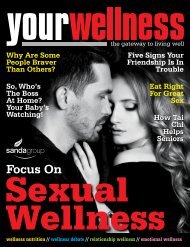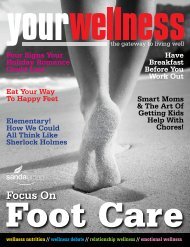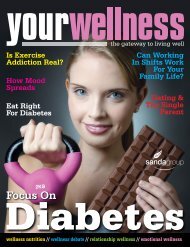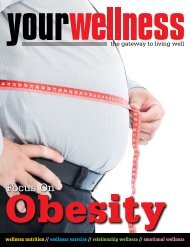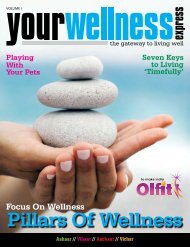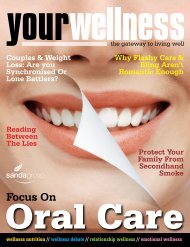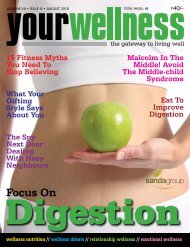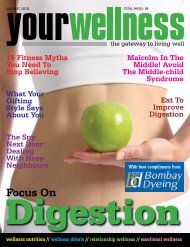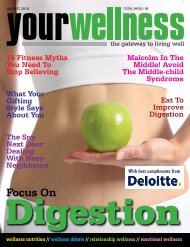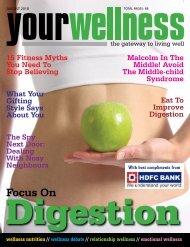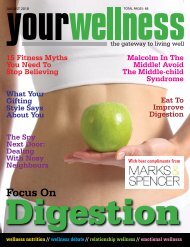New India_Assurance_ISSUE_July-2018
Create successful ePaper yourself
Turn your PDF publications into a flip-book with our unique Google optimized e-Paper software.
6 wellness<br />
news<br />
Headache? Your<br />
Perfume Might<br />
Be The Culprit!<br />
More and more people are reporting that<br />
artificial scents, found in many beauty and<br />
homecare products, are triggering headaches<br />
and other ailments. In one study of 1,000<br />
people, it was found that over 30% experienced<br />
unpleasant reactions when exposed to<br />
fragrance. Meanwhile, another study found<br />
almost 35% of participants reported headaches<br />
or respiratory problems when exposed to<br />
perfumed products. Furthermore, a study<br />
by Harvard Medical School found scented<br />
products triggered migraines in 60% of<br />
migraine sufferers.<br />
If you find you suffer adversely from<br />
chemical scents, it may be difficult to<br />
avoid them when out and about. But the<br />
good news is that manufacturers are<br />
increasingly developing non-fragranced<br />
versions of popular products for you to<br />
choose for your own home.<br />
- Eckhart Tolle<br />
If you get the inside right, the<br />
outside will fall into place.<br />
TV Raises Blood<br />
Clot Possibility<br />
If you’ve found a new television series or box<br />
set that you love watching it might be tempting<br />
to watch just one more episode (and then<br />
perhaps a couple more). But new research<br />
by the University of Minnesota suggests that<br />
sitting in front of the television for hours on<br />
end could increase the risk of developing a fatal<br />
blood clot. During the study, 15,000 adults<br />
were analysed and divided into four groups<br />
depending on how much TV they watch. Those<br />
who said they sit in<br />
front of the television<br />
‘very often’ are 1.7<br />
times more likely to<br />
develop certain types<br />
of blood clots. The<br />
results were consistent<br />
even when weight and<br />
exercise levels were<br />
taken into account.<br />
Night Light &<br />
Preschoolers<br />
A new study by University of Colorado<br />
Boulder research, published in the journal<br />
‘Physiological Reports’, says that exposing<br />
preschoolers to an hour of bright light<br />
before bedtime almost completely shuts<br />
down their production of the sleeppromoting<br />
hormone melatonin and keeps<br />
it suppressed for at least 50 minutes<br />
after lights out. Because of structural<br />
differences in their eyes, children may<br />
be more vulnerable to the impact light<br />
has on sleep and the body clock. Says<br />
study author Monique LeBourgeois, “The<br />
preschool years are a very sensitive time<br />
of development during which use of digital<br />
media is growing more and more pervasive.<br />
We hope this research<br />
can help parents<br />
and clinicians make<br />
informed decisions<br />
on children's light<br />
exposure.” Parents, dim<br />
the lights in the hours<br />
before bedtime.<br />
Get A Pet For<br />
Better Mental<br />
Health<br />
Dog owners have long known the benefits<br />
of getting out and about for a walk with<br />
their pooch. And cat lovers often testify<br />
to the relaxing benefits of stroking<br />
their favourite feline. But now research<br />
published in the journal ‘BMC Psychiatry’<br />
suggests that what pet owners have<br />
claimed could be true. Of course, using<br />
pets for therapy to improve mental health<br />
is nothing new; many hospitals, care<br />
homes and respite centres regularly use<br />
pets as part of their service to treat anxiety<br />
and help patients and residents relax. In<br />
this latest research, a team from three<br />
universities looked at 17 international<br />
studies and found that<br />
all the pet owners across<br />
each of the studies stated<br />
that their relationship<br />
with their pet helped<br />
them through the ups and<br />
downs of everyday life as<br />
well as providing comfort<br />
in more difficult times.<br />
yourwellness.com • Volume VII • Issue II • <strong>July</strong> <strong>2018</strong>






